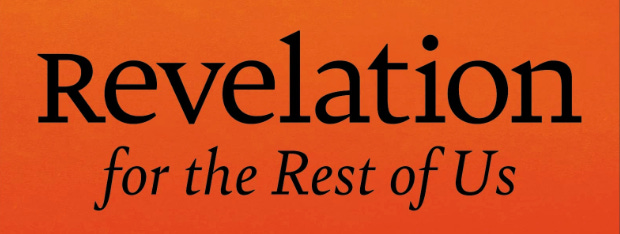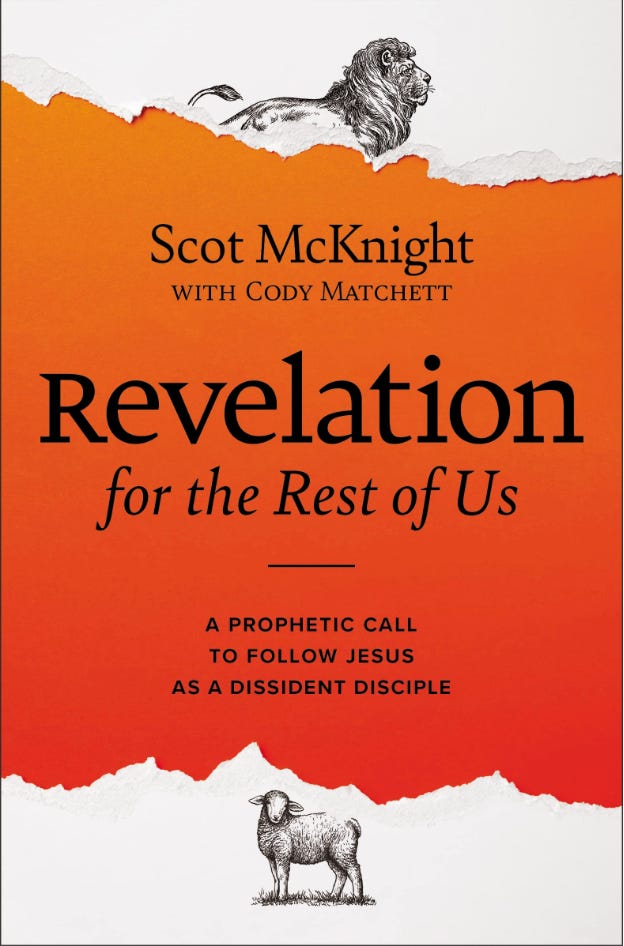Revelation is for Listeners
By Cody Matchett
I serve as the Scholar in Residence at First Assembly Church in Calgary Alberta Canada, where I live with my wife Brianna who is a counseling therapist and our two children Aletheia and Atticus. I am one of Scot’s former MA students, a hopeful future PhD student, and the co-author of our upcoming book, Revelation for the Rest of Us: A Prophetic Call To Follow Jesus As A Dissident Disciple.
Scot asked if in anticipation of the release of our forthcoming book (at the end of February) that I would contribute a reflection on researching, teaching, and writing on Revelation.
At this point, I have been privileged to teach through the book of Revelation on numerous occasions, to lead seminars on topics related to the book, and run various workshops on reading scripture.
And while there are many ways one could begin courses, construct sessions, and frame workshops on the book of Revelation—with various interpretive schemes, the historical circumstances, or the history of influence—I have taken to begin all my sessions on Revelation with a lengthy invitation to listen; to viscerally experience the events of Revelation: to see the narrative sequences unfolding before our eyes, and ultimately, to have ears to hear (2.7, 11, 17, 29; 3.6, 13, 22; 13.9).
To collectively engage in what I have come to call, ‘the hospitality of hearing.’
We begin our sessions with an emphasis on listening, because as first century philosopher, historian, and essayist, Plutarch highlights at the beginning of his essay, ‘On Listening,’ the most common fault of those learning philosophy is speaking before listening.
Plutarch puts it this way, “they practice speaking before they have got used to listening, and they think that speaking takes study and care, but benefit will accrue from even a careless approach to listening.”[1]
According to Plutarch, while vice may enter through many bodily regions/parts and affect our mind, virtue has only one singular point of entry, the ears.[2] As Plutarch later quips echoing the words of Zeno of Citium, “Nature gave each of us two ears, but one tongue, because we should listen more than we speak.”[3]
In other words, in learning to philosophize, students must learn to “listen a lot but speak little.”[4]
In teaching students to discover the contents of Revelation, these words summarize my entire approach, “listen a lot but speak little.”
Why?
The answer may seem obvious but let me spell it out anyway.
When it comes to Revelation, we are not dissimilar to Plutarch’s young friend Nicander. We are prone to ‘theologize’ by way of speaking much about the book of Revelation instead of listening.
It seems to me that we have stopped listening to the book of Revelation.
Instead of listening, being hospitable to hear the words penned by John, we come to the text with a myriad of assumptions, presuppositions, and frameworks.
The tragedy of coming to the text of Revelation in this way is that it was written to be heard, designed for listening, prepared for performance. After all, Revelation begins with these words, “Flourishing is the one reading and those hearing the words of the prophecy, and those observing [the words] that have been written within it…” (1.3).
The sequence is quite simple: Reading (Singular)—Hearing (Plural)—Observing (Plural).
Again, this is why I begin all of my sessions with listening.
In fact, my last time teaching through the book of Revelation, all my student assignments revolved around listening: listening through the book in one sitting and reflecting, constructing structural outlines, sketching characters by re-casting the text in their own language, describing the sequence of narrative patterns, and drawing comparisons with the Hebrew Bible.
In listening, my students often come to Revelation expecting to find emphasis on the rapture, the great tribulation, the mark of the beast, the anti-christ, the millennium, and the destruction of the cosmos. They often come as speculators (the technical term here is dispensationalist) seeking to find evidence for the signs of the times as they await the rapture, the literal unfolding of seals, trumpets, and bowls, and the anti-christ leading an end times Babylon.
I invite all my students in our first sessions, ‘to be hospitable in your hearing,’ ‘listen intently,’ ‘speak little’ and ‘allow the words to become strange and unfamiliar to you.’
I have learned one thing from this process with my students: the act of listening deconstructs.
The students listen, which leads to deconstruction, which leads to student reports not about the rapture, millennium, or the anti-christ, but of being struck by the scandalous call to follow the lamb as faithful witnesses,[5] the paradoxical nature of conquering by being conquered,[6] the visions of hope that ‘rapture’ us from the cycles of seals and trumpets,[7] the shifting nature of the visceral scenes, the hope, the dissidence, the resistance, the dangers of Babylon,[8] the way Babylon has penetrated the church,[9] and the invitations to come out of her.[10]
All this listening often leads the students to an unsettling realization—the students have never really listened to the actual text of Revelation.
In never listening, the students have never truly heard what the Spirit is saying to the churches.
The emphasis on listening urges us to hear; and hearing deconstructs, and that deconstruction allows us to observe the words. Ultimately, listening will lead to observing, keeping (NRSV, NKJV, ESV), obeying (NET), and taking to heart (NIV) the words penned by a first century dissident from an island on the Aegean Sea.
John ends with the same words as the beginning, “Flourishing are those who observe the words of this book’s prophecy” (22.6-7).
Notice that by the end, the assumption is that someone has read the entire book of Revelation, we have heard the entirety of the prophecy, and our hearing should now produce one thing, observing (1.3; 2.26; 3.3, 8, 10; 12.17; 14.12; 16.15; 22.7, 9).
Perhaps the primary reason most of us do not observe, obey, or take to heart the words of Revelation is because we no longer truly listen to the words written in it?
Are we willing to listen to Revelation by leaving our assumptions, presuppositions, and frameworks at the door?
It seems to me that all of our assumptions, presuppositions, and frameworks keep us from truly listening; and instead, we become inhospitable in our hearing.
When we truly listen, however, we often come to realize what my students realize—the words of revelation are meant to be observed, which can only mean one thing, the book of Revelation is primarily about discipleship: “Following the Lamb wherever he goes” (14.4).
According to John, true listening will lead to faithful observance.
The book is designed to teach its listeners how to follow King Jesus, as dissident disciples, allegiant witnesses in the midst of Babylon.
As Plutarch notes at the end of his essay, “proper listening is the foundation of proper living.”[11]
The rest of us need a new way of reading Revelation, and I am convinced this new way begins with the hospitality of hearing. In listening, we discover exactly what we try to capture in the subtitle of our book, the “prophetic call to follow Jesus as a dissident disciple.”
We are invited to engage in the hospitality of hearing, to learn (once more or for the first time) to listen to John’s Revelation. And as we listen, we will discover the foundation for proper living, the way of the slaughtered and standing lamb.
If anyone has an ear…Listen. Hear. Observe.
[1] Plutarch. Essays (Penguin Classics), 29. Italics Added.
[2] Plutarch. Essays (Penguin Classics), 28.
[3] Plutarch. Essays (Penguin Classics), 31. Italics Added.
[4] Plutarch. Essays (Penguin Classics), 30.
[5] Revelation 1.2, 5, 9; 2.13; 3.14; 6.9; 11.3, 7; 12.11, 17; 10.19; 17.6; 20.4; 22.16, 18, 20.
[6] Revelation 2.7, 11, 17, 26-27; 3.5, 12, 21; 5.5; 6.2; 11.7; 12.11; 13.7; 15.2; 17.14; 21.7.
[7] The Interludes: Revelation 7.1-8, 9-17; 8.3-5; 10.1-11; 11.1-14; 12.1-17; 13.1-18; 14.1-13, 14-19; 15.2-4.
[8] Revelation 17-18.
[9] Revelation 2.4, 14, 20; 3.1, 2, 15.
[10] Revelation 18.4. Cf. Isaiah 48.20; 52.7-11; Jeremiah 50.8; 51.6, 9, 45.
[11] Plutarch. Essays (Penguin Classics), 50. Italics Added.




In August, 1989 (I'm old) my wife and I went to a stage play at the Woodruff Arts Center's Studio Theater in Atlanta for our 16th wedding anniversary. We went on a ten day trip to Hawaii for our 15th anniversary and I knew I couldn't afford to top that experience so we went to a very nice restaurant for dinner, and then across Peachtree Street to the Woodruff Arts Center for the play.
I had seen an ad in the newspaper for the play. It was titled "Revelation," but offered no explanation. It was a one-man play, performed by a local Atlanta actor named Tom Key. We had seen him perform in several contexts - including the stage play adaptation of Clarence Jordan's "Cotton Patch Gospel." We both liked him so I took a chance and bought tickets.
The Studio Theater at the time was relatively small, maybe seating 250 people. The stage was very simple: a stool, a fake ancient-world looking column, and a plant of some sort on the column. Tom Key came out dressed in khakis and a blue buttoned-down shirt with the sleeves rolled up almost to his elbows.
He stepped out on stage and started speaking - from memory - the words of Revelation. He went through the words powerfully, until 11:14, "The second woe has passed. The third woe is coming very soon." There was a fifteen minute intermission.
When he came back on stage, he picked up right where he left off and marched with intent to the end. I can still remember the rise in blood pressure during the pouring out of the seven bowls of the wrath of God; only to be replaced with the peace of "Behold, the dwelling place of God is among humankind." (21:3)
As he was finishing, unlike most plays I have attended in Atlanta, no one started getting their stuff to get ready to rush out. We listened to the very end. It seemed like an eternity, but for a few seconds there was no applause. Then a standing ovation. As people left, they seemed to be much quieter than normal. It was almost like the somberness of walking out of a funeral home after a visitation in the south.
I remember thinking as we walked up the steps to the main floor where the exits were, "I'm so glad I'm a follower of Jesus. He wins." And, as I told my wife in the car driving home, "If I weren't a follower of Jesus already, I'd be looking for a preacher to help me figure this all out."
I didn't need to know what any symbol in book meant. I just knew - perhaps in a more powerful way than ever - that Jesus wins. For me that was a "light-bulb moment" and it occurred to me that apocalyptic language is more drama than I had realized, and needs to be experienced as much as if not more than, interpreted (in a technical way).
I don't know the demographics of the crowd that night. The parking lot was not filled with sixteen passenger church vans, so I'm guessing it wasn't particularly church-going folks. If the lines at the bar before and during intermission is an indicator, it wasn't evangelical since at time we certainly didn't drink alcohol in public and the lines were long!
But the audience was stunned - and I think, despite Tom Key's impressive performance - there was more to the stunning than that.
Thank you for this post. It reminded me of this great moment in my own life - quite a while back in time, but as fresh and meaningful as though it were but yesterday.
Thank you thank you thank you